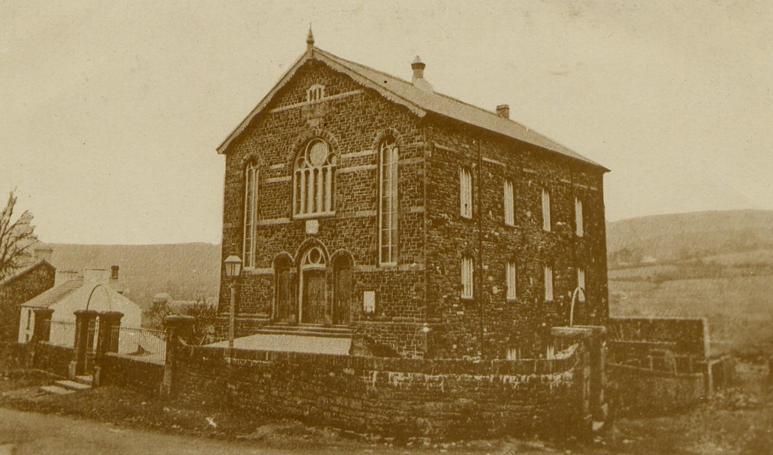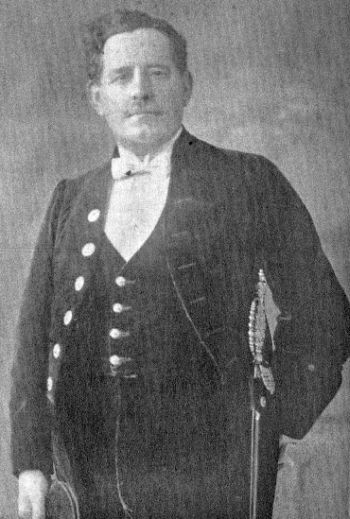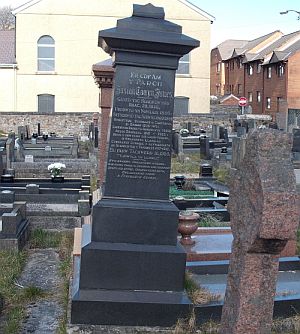Josiah Towyn Jones came to Cwmamman as a minister
of New Bethel Chapel in 1884, a post which he maintained for the
next twenty years. At that time, New Bethel, with a congregation
of approximately 1,300, was regarded as one of the strongest congregational
churches in Wales.

New Bethel Chapel c.1911
Towyn, as he was known locally, was born in a modest
house named Towyn Bach at Newquay in Cardiganshire on the 28th of
December 1858. He received a basic education at his local school
where he gained a reputation for his reciting, having a good memory
and elocutionary talent. Towyn was the grandson of a well known
Hymnologist, Tom Jones of Rhiwson.
After starting his working life on a farm, he left
home at the age of twelve to become a mariner, working as a cabin
boy on small ships.
While Towyn visited his home on a period of leave
(another story says that he had been dismissed for breaking crockery*),
he was induced to become a student at Towyn Grammar School where
he remained for nine months. On the advice of his pastor, Rev. Penry
Evans, he sat and passed an entrance exam for Carmarthen Presbyterian
College and won the Berman Entrance Scholarship of £50.
After three years in College, Towyn was ordained as
a minister at Gwernllwyn Welsh Independent Chapel at Dowlais in
June of 1880. The chapel amusingly became known as "Capel Crwts"
(toddlers or kids chapel) because the youthfulness of the minister
and much of the congregation! He remained there for four years before
succeeding Rev. T. Eynon Davies at New Bethel Chapel at Garnant
in 1884.
In 1885, Towyn married Miss Mary Howells of Plas Cadwgan,
Swansea. The couple had two daughters, Elsie and Eira.
While at Garnant, Towyn was a prominent figure in
the life of the village, being a member of Carmarthenshire County
Council, Chairman of the Llandeilo School Board, Governor of the
University Colleges of South Wales and Aberystwyth, member of the
Management Committee of the Intermediate School at Llandeilo. He
was Secretary of the Welsh Congregational Union as far back as 1896,
becoming Chairman in 1917. His presidential address at Pwllheli
was titled "Christ and The New Age."
Towyn had a strong interest in politics and was Secretary
of the East Carmarthen Liberal Association, Secretary of the Amman
Valley Liberal Association and a member of the Executive of the
South Wales Liberal Federation.
In 1904, Towyn left Garnant to become Secretary of
the Welsh Congregational Century Fund.
Towyn was a very skilled organiser and was in great
demand as a public speaker, his eloquence referred to as "Torrential".
He was also very energetic and once travelled 4,000 miles in only
three weeks, speaking and lecturing. It was said that Towyn had
occupied most of the pulpits in Wales in his time. Josiah Towyn
Jones was the first minister to preach from the pulpit of Brynseion
Chapel, Glanamman, when it opened on Sunday the 12th of May 1912.
He led the South Wales area in resisting the Balfour
Education Act of 1902 and it was on Towyn's advocacy that the voluntary
schools in Carmarthenshire refused to administer the act.
As an ardent Welshman, it was Towyn's belief that
the Welsh language deserved to be taught on an even footing as English
in secondary schools and pressed the Central Welsh Board to employ
this.
After acting as agent for the Liberal M.P. Abel Thomas
K.C., Towyn was chosen as the Liberal candidate to replace him when
he died in 1912. Towyn won the by-election with a large majority
and became M.P. for Carmarthenshire East that year. Towyn became
Government Welsh Whip and Junior Lord of the Treasury in 1917.

Josiah Towyn Jones
The Carmarthenshire East constituency was abolished
in 1918 and Towyn became M.P. For the newly established Llanelly
constituency in the general election held that year with a majority
of 1,935.
In the Summer of 1922, Towyn had to retire due to
ill health and moved to New Quay, Carmarthenshire.
Towyn died at his daughter's home at Ammanford on
Monday the 16th of November 1925 and was buried on the following
Wednesday Afternoon at Gellimanwydd (Christian Temple) cemetery
on Hall Street.
A service conducted by Rev. John Llewelyn of Rhosaman
and Rev. Glannant Davies, took place at the house and the oak coffin
was then borne on a bier to Gellimanwydd where the main service
was conducted by Rev. D. Tegfan Davies. Various others paid tributes
at the Gellimanwydd service. A large crowd attended the funeral,
including many clergymen of all denominations. Among the floral
tributes received were those from David Lloyd George and the Prince
of Wales lodge of Freemasons, Llanelly.

Towyn's Grave. To view the inscription, please click
on the above image.
An English translation of the stone's inscription
is:
IN MEMORY OF
THE REVEREND
JOSIAH TOWYN JONES
Born in New Quay
26 December 1858
Ordained in Dowlais 1880,
Established Glanamman 1884
Home Missionary Inspector of
his denomination 1906-1912
Chair of the Union of Independents 1920
Member of Parliament 1912-1922
(1) For East Carmarthenshire
(2) Llanelli Division
Welsh government whip
and Junior Lord of the Treasury
Died November 16, 1925
"A candle always burning"
______________
A gentle man, eloquent preacher,
Fiery orator, successful minister,
Vigilant citizen, fearless politician,
Strong Patriot,
And a favoured person of his nation.
A letter from Lloyd George was sent to Towyn's daughters
and in it was an acknowledgment that it was Towyn's endeavours which
helped Lloyd George return as an M.P. For Carnarvon Boroughs in
a by-election held in 1890. Lloyd George won by only 19 votes, but
became the first Welsh Prime Minister in 1916. Like Towyn, Lloyd
George's first language was Welsh. The letter read as follows:
"I am deeply grieved to hear of the death of
your father, who was one of my most sincere political comrades.
His eloquent delivery in Bangor 35 years ago contributed materially
to my return in that hot contest. He and I were closely associated
in Welsh politics, and his breakdown in health was a great loss
to Liberalism, and a great personal blow to myself."
The extensive obituary in the 19th of November 1925
edition of the Amman Valley Chronicle stated "…he spent
himself in the service of Wales. He lived at top speed, and accomplished
a tremendous amount of work."
One of Towyn's brothers, Jenkin Jones, was headmaster
of Brynamman Infants School.
Information for this article was taken from the
19th November 1925 edition of the Amman Valley Chronicle. * Denotes
information on National Library of Wales website. Thanks to Sue
Nordberg for contributing the photograph of Towyn and to Terry Norman
for the photograph of Towyn's Grave and the translation of the stone's
inscription.